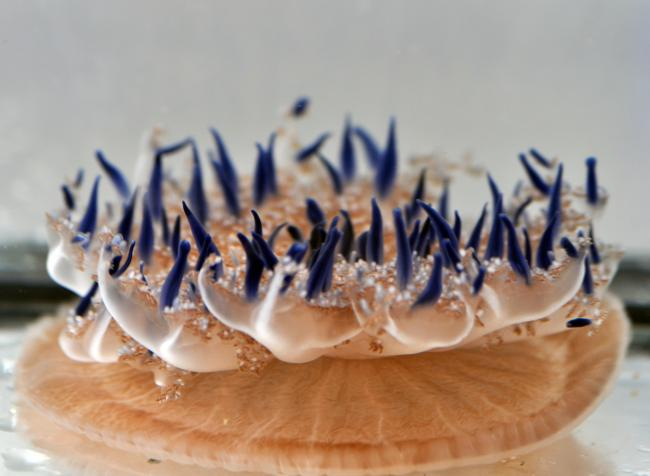Jellyfish, also known as medusae, are among the oldest living creatures on earth and could offer a surprising answer to the challenges of global food security. These fascinating sea creatures not only provide valuable proteins, essential fatty acids and vitamins, but also require neither fresh water nor agricultural land for their cultivation. Some species, such as the mangrove jellyfish Cassiopea andromeda, can even produce marine protein with the help of sunlight thanks to photosynthetically active endosymbionts. This food4future project is investigating how jellyfish can be cultivated in modular recirculating aquaculture systems. These closed systems are resource-efficient, sustainable and open up a wide range of potential applications - from food to food supplements and cosmetic products. During the first project funding phase, we selected Cassiopea andromeda as a model organism and laid important foundations for the cultivation of jellyfish in urban, saline indoor cultivation systems. Through the targeted control of environmental parameters such as light, temperature and nutrient supply, the production of valuable ingredients such as carotenoids, omega-3 fatty acids and proteins could be increased. The first protocols for the indoor cultivation of this jellyfish species have also been developed.
A jellyfish of the species Cassiopea spp. The mangrove jellyfish are cultivated in the seawater aquarium of the Leibniz Center for Tropical Marine Research (ZMT). Photo: A. Meyer/ZMT.
In the current funding phase, we are focusing on scaling up the cultivation of jellyfish and further expanding their potential uses. Particular emphasis is being placed on optimizing growth conditions in order to further improve biomass production and ingredient profiles. At the same time, work is being carried out on integrating residual material flows into the jellyfish cultivation system in order to reduce resource consumption and promote circular production. In addition, the ZMT team is researching the identification of jellyfish species with a high content of health-promoting ingredients for use in food, food supplements and cosmetics. The integration of co-cultivation approaches such as jellyfish together with other marine organisms, such as macroalgae or shrimp, also opens up new possibilities for conserving resources. In this way, synergies can be exploited and the environmental impact further reduced.
Jellyfish offer an extraordinary opportunity to strengthen a safe and sustainable food supply. They can be established as an alternative, resource-saving food source. Our aim is not only to create new types of food and products, but also to make a decisive contribution to the transformation of agricultural systems. This food4future project combines state-of-the-art technologies with practice-oriented innovation and thrives on close cooperation with partners from science and industry. The focus is on the efficient indoor cultivation of macro- and micronutrients, which serves as the basis for future-oriented applications in nutrition and beyond.
Text: H. Kühnhold, ZMT
Contact
Leibniz-Zentrum für Marine Tropenforschung (ZMT)
AG Experimentelle Aquakultur
Fahrenheitstr. 6
28359 Bremen
Website
www.leibniz-zmt.de
Project duration
Oktober 2024 - September 2028
Interaction with f4f and associated partners
IGZ, DIfE, Hochschule Bremerhaven, Jellyfish Farm GmbH, Deltec GmbH, MARE, AWI, Uni Bayreuth, ATB,THW, PYCO, Cosmacon GmbH, OceanBasis GmbH, Mibelle Group, CUBES Circle, DAKIS, GreenGrass, NOcsPS, SUSKULT

Dr. Andreas Kunzmann is an expert in ecophysiology (role of stress on metabolism & turnover), with direct application in aquaculture, where food and energy budgets play a key role. IMTA (integrated multi-trophic aquaculture) and bioremediation in tropical coastal areas are in focus. His ecophysiology group has several IMTA projects in Africa and Asia. Andreas Kunzmann is a member of the Leibniz Research Alliance “Sustainable Food Production and Healthy Nutrition” (LFV-LE) and has more than 30 years of work experience in tropical countries.

Dr. Holger Kühnhold is a PostDoc in the working group “Ecophysiology and Experimental Aquaculture” at the ZMT. His research focuses on the establishment of various biomarkers (e.g. respiration, enzyme activity and gene expression) as indicators of environmental stress, the cultivation of marine invertebrates (e.g. sponges, sea cucumbers and jellyfish) and the utilization of marine resources for the production of new foods, especially with regard to alternative protein sources. In addition, Dr Kühnhold is committed to the sustainable development of aquaculture through lectures and public talks (e.g. as a DAAD short-term lecturer in Tanzania) and workshops (planning and organization of an LFV-LE workshop on aquaculture).

Dr. Lara Stuthmann is a postdoc in the "Experimental Aquaculture" working group at the ZMT. Her research focuses on the aquaculture of marine organisms at the base of the food chain (e.g., algae, jellyfish, and worms). She uses ecophysiological and biochemical methods to explore possibilities for studying the quality and quantity of these organisms and their potential use as food. Dr. Stuthmann is also exploring how such new, blue foods could become part of a systemic approach to transforming the agro-food system. She is particularly interested in how young consumers could become more open to such future foods.
Kühnhold H, Schreiner M, Kunzmann A and Springer K. (2023) Light intensity changes and UVB radiation affect peridinin content and antioxidant activity in the Cassiopea andromeda holobiont. Frontiers in Marine Science.
doi: 10.3389/fmars.2023.1048346
Ahern M, Thilsted SH, Oenema S, Cartmill MK, Brandstrup Hansen SC, Doumeizel V, Dyer N, Frøyland L, Garrido-Gamarro E, Kühnhold H, Mohammed E, Penarubia O, Pptin P, Sharan S, Utheim Iversen A, Uyar B, Vannuccini S, War and Zhou X. (2021) The Role of aquatic foods in sustainable healthy diets. UN Nutrition.
Download PDF
Kunzmann, A., Kühnhold H. Kapitelbeitrag „Nahrung aus dem Meer“ in der 7. Ausgabe des World Ocean Reviews WOR 7 (2021) "Lebensgarant Ozean – nachhaltig nutzen wirksam schützen"
Download PDF
